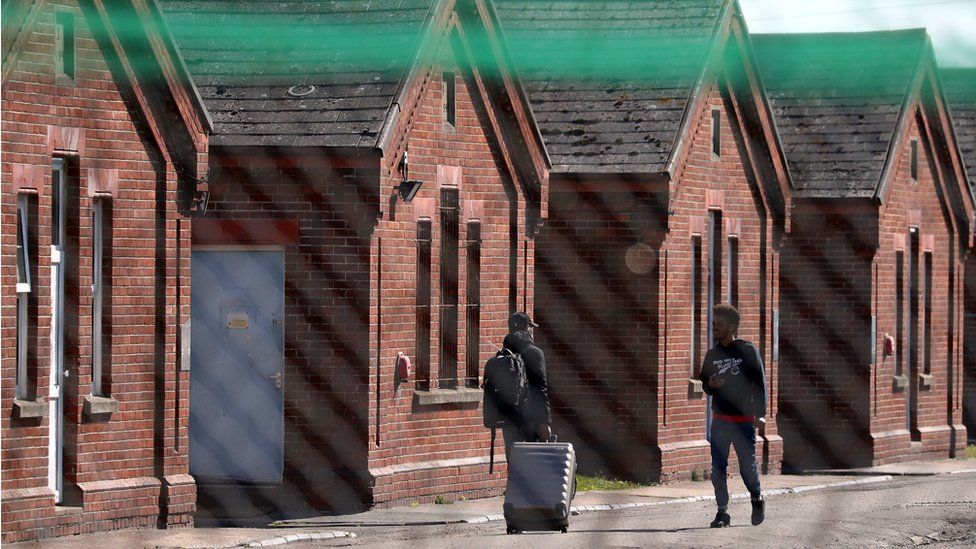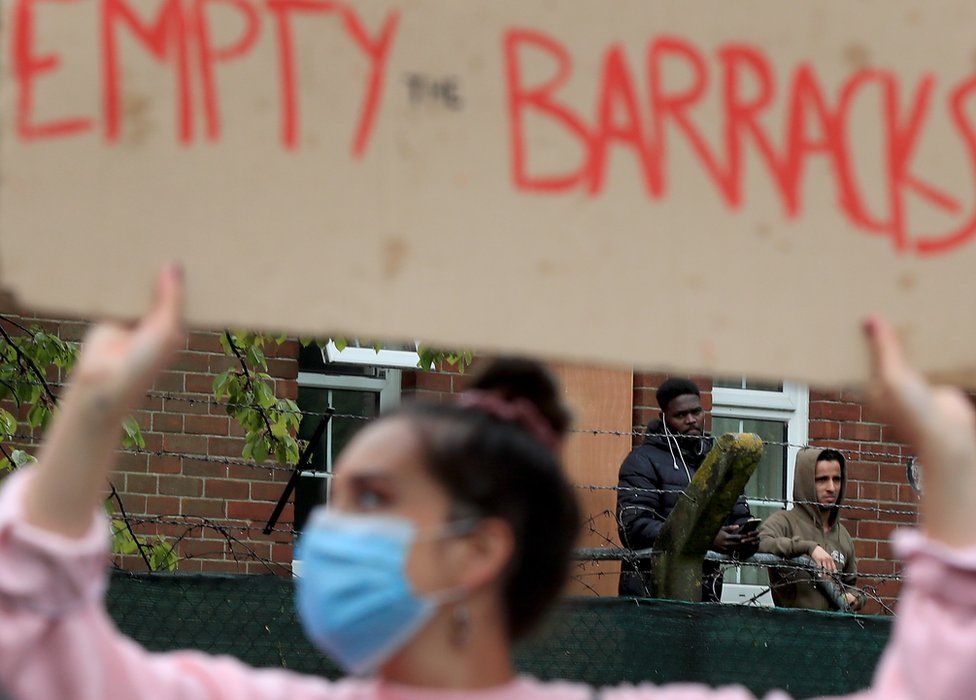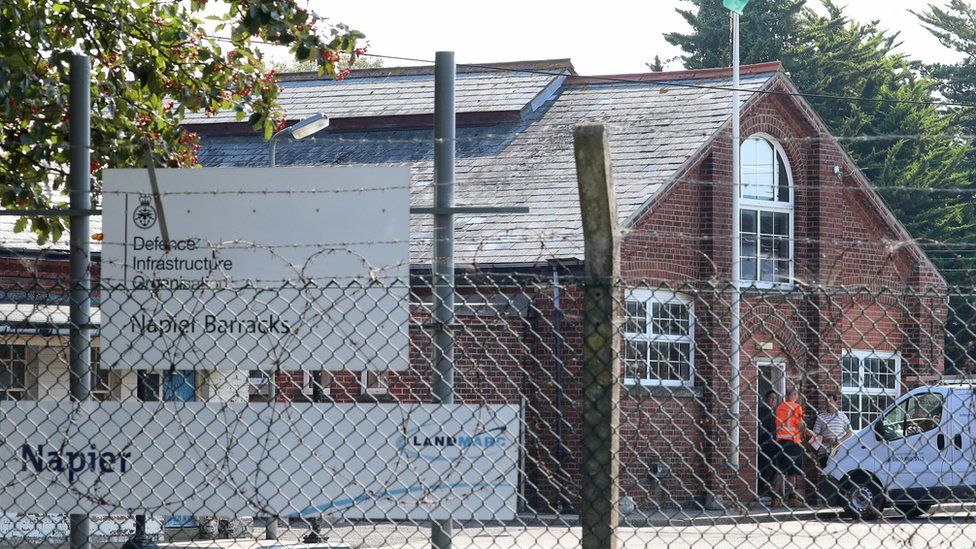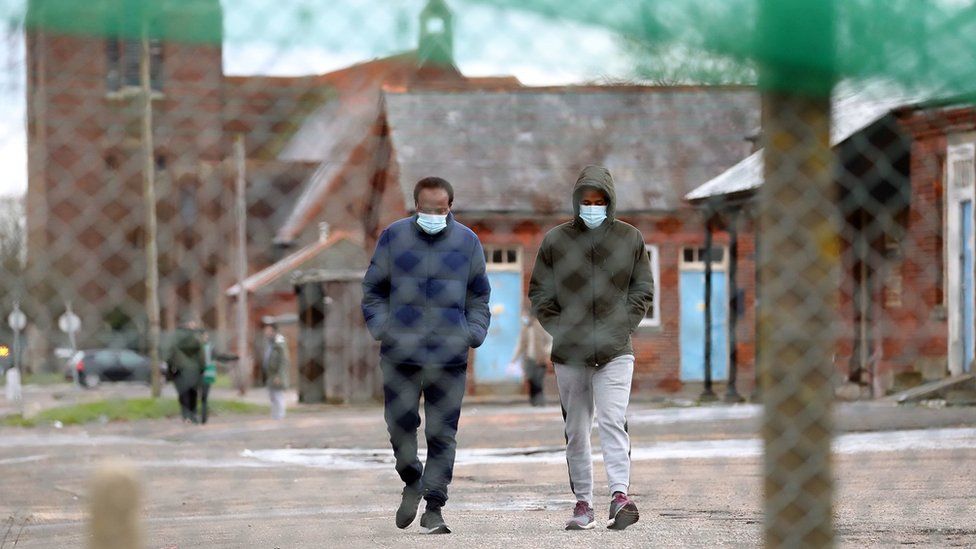
The Home Office's decision to house cross-channel migrants in a "squalid" barracks in Folkestone was unlawful, the High Court has ruled.
Six asylum seekers brought the case, claiming Napier Barracks was "unsafe" and dormitory use caused a Covid-19 outbreak earlier this year.
The ruling could see a damages claim against Home Secretary Priti Patel.
The Home Office said use of the barracks would continue, and it was considering its "next steps".
The judgment could lead to further cases from any other men held at the camp who can bring similar evidence to court.
Mr Justice Linden's judgment looked in detail at a fire that broke out at the site in January, and when nearly 200 people contracted coronavirus during an outbreak at the camp.

The ruling followed hearings that took place in April.
The judge said: "I do not accept that the accommodation there ensured a standard of living which was adequate for the health of the claimants.
"Insofar as the defendant considered that the accommodation was adequate for their needs, that view was irrational."

Failings at the barracks included:
- Overcrowding
- Lack of ventilation
- Run-down buildings
- Use of communal dormitories during a pandemic
- Significant fire risks
- 'Filthy' facilities
- 'Decrepit' isolation block not fit for habitation

Mr Justice Linden also criticised the "detention-like" setting for the men.
He said: "They were supposed to live voluntarily pending a determination of their applications for asylum.
"When this is considered, a decision that accommodation in a detention-like setting - a site enclosed by a perimeter fence topped with barbed wire, access to which is through padlocked gates guarded by uniformed security personnel - will be adequate for their needs, begins to look questionable."

Lawyers from Deighton Pierce Glynn had claimed the site - which they said still housed nearly 300 people - had breached the migrants' human rights.
A statement said: "People seeking asylum are more vulnerable to physical and mental illness. They have the right to be treated with dignity and should not be accommodated in detention-style barracks."
In April, the court heard public health experts had repeatedly raised concerns about the use of the site during a pandemic, while an independent report found seven suicide attempts and seven incidents of serious self-harm.
Tom Hickman QC, representing four claimants, previously told the court the site was "squalid, ill-equipped, lacking in personal privacy and unsafe".
Lisa Giovannetti QC, representing the Home Office, said clinically vulnerable people had been "sifted out".
She said Ms Patel had decided the barracks could be used safely by "introducing safeguards".
But in a statement read to the court, one of the claimants, who was later moved to other accommodation, said: "The situation in the camp is very bad and degrading."
"Detainees in the barracks including myself have lost hope."

The judge declined to rule the barracks could never be used to house asylum seekers, but called for "substantial improvements".
The Home Office and the six men have yet to agree on damages.
A Home Office spokesman said: "During the height of the pandemic, to ensure asylum seekers were not left destitute, additional accommodation was required at extremely short notice.
"Such accommodation provided asylum seekers a safe and secure place to stay. Throughout this period our accommodation providers and sub-contractors have made improvements to the site and continue to do so.
"It is disappointing that this judgment was reached on the basis of the site prior to the significant improvement works which have taken place in difficult circumstances."

Follow BBC South East on Facebook, on Twitter, and on Instagram. Send your story ideas to southeasttoday@bbc.co.uk.
Related Internet Links
https://news.google.com/__i/rss/rd/articles/CBMiM2h0dHBzOi8vd3d3LmJiYy5jby51ay9uZXdzL3VrLWVuZ2xhbmQta2VudC01NzMzNTQ5OdIBN2h0dHBzOi8vd3d3LmJiYy5jby51ay9uZXdzL3VrLWVuZ2xhbmQta2VudC01NzMzNTQ5OS5hbXA?oc=5
2021-06-03 10:51:48Z
52781641848237
Tidak ada komentar:
Posting Komentar